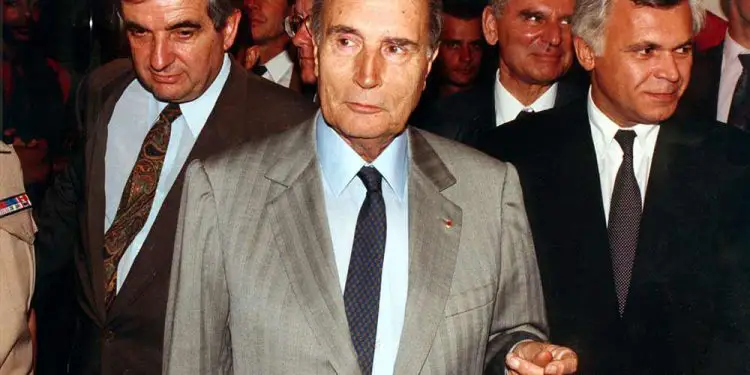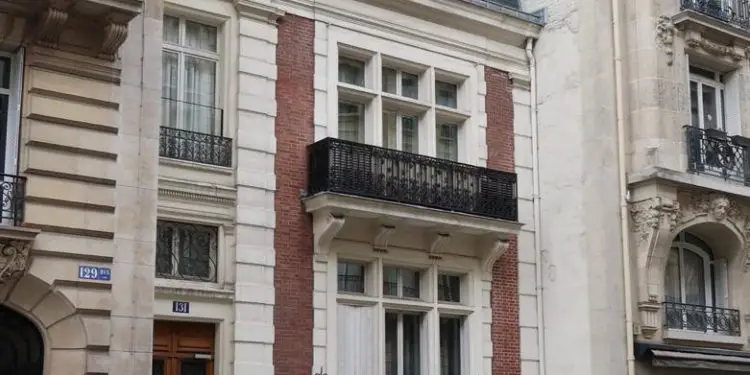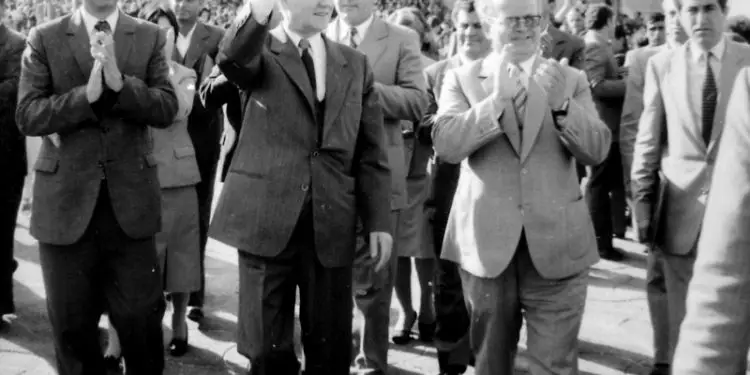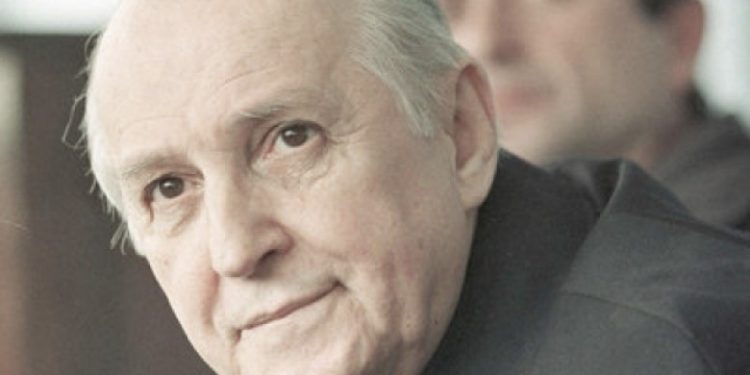Dashnor Kaloçi
Memorie.al publishes an unknown archival document extracted from the Archive of the Ministry of Foreign Affairs in Tirana, dated December 25, 1990, which contains a report-information of the Albanian Embassy accredited in Paris, which is sent to the Ministry of Foreign Affairs. Of Foreign Affairs in Tirana, with the discussion of the diplomat Vladimir Xhelili who acted as press attaché at that diplomatic mission, held in the annual analysis of the work of the embassy, which reflects some of the main events of that year, where the most important is of July 2 of that year, otherwise known as the “embassy event”, as well as that of October 24, when the world-famous writer, Ismail Kadare, sought political asylum in France. The full discussion of the diplomat Xhelili, who after making a summary of the work he covered there as a press attaché, in his discussion saw the embassy event as a “phenomenon that was fueled more after the speech of the French president, Mitterrand, to held on Radio London on July 6 of that year “, while the event of the well-known writer, Ismail Kadare, was not seen as a coincidence, but that” was created to eclipse the meeting of Foreign Ministers of the Balkan countries held in Tirana, exactly on October 25, 1990 ”!
At the end of 1990, as was usually the case with all the various institutions and departments of the Albanian state, even those of the diplomatic service accredited in different countries of the world, made the analysis of their one-year work. In this context, the Albanian embassy in Paris underwent an in-depth analysis of all its work for 1990, a year which had marked two major events for it; that of July 2 (otherwise known as the embassy event, because a large number of citizens entered the French embassy in Tirana), as well as that of October 25 of that year, where the famous writer Ismail Kadare, through the waves of Voice of America reported that he had sought political asylum in France.
Events which occupied the main place not only in the analysis of the Albanian embassy in Paris, but also in the public opinion in Albania, and throughout the print and visual media throughout Europe and beyond. This is also made known in this archival document (dated 25.12.1990) that we are publishing in this chapter of the book, in which is published the discussion of the press attaché at that embassy, Vladimir Xhelili, where he has described there not only the work as a press attaché and an overview of what the French and European press wrote about what was happening in Albania at that time, but from his point of view, he made an analysis of both the “embassy event” and the “Kadare problem”.
While the event of the embassies was not predicted to happen, or rather “remained in the hands” of the communist regime led by the duo Ramiz Alia – Nexhmije Hoxha, the “Kadare problem” was not unknown, which we have seen in previous chapters of this book, where since the beginning of the 80s (after the trial of the so-called “hostile group of Mehmet Shehu”), official Tirana had imposed an “embargo” on the well-known writer.
And this “embargo” had begun with the unilateral termination of the contract for the shooting of the film “The General of the Dead Army”, where the Deputy Foreign Minister, Sokrat Plaka, announced several embassies: “Do not give a visa for Albania, the group of filmmakers Frenchman led by Michel Piccoli “, continued with a series of rejections for the invitations that came to Kadare from abroad (Fayard, PEN CLUB, TV Franc 1, etc.), where the Foreign Minister Reiz Malile himself, or the deputies, etc. Not to go, it is not the right moment “,” Kadare to thank them for the invitation and to tell them that he is engaged in another activity “etc.
To come in 1985, where the French government several times formally proposed to the Albanian government, if it would agree that France decorate the writer Ismail Kadare with its highest medal, “Legion of Honor”, and then nominate him for the Nobel Prize. While official Tirana, not only did not accept this, but “threatened” the French government, saying: “If the French government will do this unilaterally, then”. And this position was maintained by official Tirana again in 1989 and 1990, when the French government repeated several times the request for the decoration of Kadare, where the highest head of the Ministry of Foreign Affairs and Albanian diplomacy, such as Reiz Malile, Socrates The old woman, Kujtim Hysenaj, etc., in the relevant documents wrote: “Behind the request for Kadare’s decoration are hidden other purposes… to be left in silence”, “Do not answer”, etc.
And all this was “covered” by the statement of Ramiz Alia at the meeting of the Politburo on July 24, 1990 (for the event of the embassies), where at the height of his rage, among other things he said: “Kadare, or to take a stand on the events of the embassies, or to come out openly on the side of the enemy “, continuing further:” How could an intellectual not say a word about the invitation made to Kadare by the French president, Mitterrand ?! ” And all this could not help but give a strong resonance and not affect the meeting of the staff of the Albanian embassy in Paris at the end of 1990, especially when Kadare was already in France, as a political asylum, which which is clear from this archival document that Memorie.al publishes in full in two issues of the historical dossier section, starting from this writing.
Discussion of the press attaché Xhelili, at the meeting of the Albanian embassy in Paris
Discussion
The year 1990 has been quite busy with historic decisions for our people, party and country. The materials that have reflected these have been numerous. I have had the task and I have tried during this period that the speeches of Comrade Ramiz Alia, the decisions of the last plenums of the Party, of the sessions of the People’s Assembly for the further democratization of the whole life of the country, be multiplied and distributed in time in the organs of press and media, in the Ministry of Foreign Affairs as well as personalities and diplomats in France and in the countries of the area we cover as Embassy.
In general, this has made better known the deep process of democratization, in which our country is engaged. The work continues.
I have regularly followed and informed the Ministry of Foreign Affairs about the articles in the French press, which, due to the developments that have taken place, have been extremely numerous and have required a great deal of commitment and time to translate them. English, Belgian and Spanish press copies, etc. have also been systematized and sent regularly. Work in this direction has increased tremendously, so in the future I think to be informed in a concise and selective way, giving the main features.
I have followed through various meetings, that the tasks of the time seek to increase, the press, etc., the policy and attitudes of France towards our country, the Balkans, towards the developments in Kosovo and Yugoslavia, as well as towards other Eastern European countries. The MFA was informed about these on a case by case basis. I have also followed the various tasks of the protocol character of the embassy for the receptions, various ceremonies that have been presented, etc., both for France and for the countries of the area we cover.
Two words about the attitude of the press and foreign policy
The French press on issues is generally noted to reflect and maintain the official position. To our country, the French mass media, and especially the print media, since the beginning of 1990, has undertaken as never before a major campaign against our country, with a tendency to obscure and denigrate the years of socialist construction during popular power, presenting them as years of savage dictatorship, oppression, persecution and police surveillance, and the complete lack of democracy and the spiritual and material impoverishment of the country.
One of the highlights of this campaign was reached with the event of the embassies in Tirana in July, when President Mitterrand himself was encouraged in this direction, publicly declaring at a press conference in London on July 6 that he “wished the Albanians to gain freedom for which they aspired to visibly like no other people (…)”.
While his Foreign Minister, R. Dymas, in a statement on July 27 in AFP, affirmed that “France showed a constant care for the very insecure situation in Albania” and further added that “when the gates open halfway to leave free to pass, it always ends completely open (….) ”and that“ the French wish and wish was for the Albanian authorities to understand this and to accompany the movement ”.
In this period, the number of articles, reports and articles with a denigrating tendency towards the 45-year reality of Socialist Albania has been very large. At times, the intensity of these writings has also declined. This depends, perhaps, on the events of the international situation that have taken place. During this period, the French press has to some extent evidenced the steps that have been taken in the democratization process in our country, but has often seen these few and made too late by road pressure.
We note that this press generally wrote little about the second meeting of the MFA of the Balkan countries, which was held in Tirana on October 24. It was enough with just a brief informative announcement. Only the newspaper “Liberation” published a relatively long article about this conference. There were central newspapers that did not write, as well as radio and television that did not announce.
The moment of Ismail Kadare’s desertion, which was not a random choice, being made public on October 25, 1990, can be said to have eclipsed the Balkan conference with the influx of numerous articles and comments throughout the French mass media.
It is currently noticed that the French mass media in its news and information about our country, is referring more and more to the Albanian sources and very rarely to the Yugoslav ones.
Any thoughts on future work
However, the interest requires that, never lowering vigilance, we work to develop relations between the two countries, reactivating in the spirit of recent decisions of the Party and the State, the agreements and protocols completed. We need to increase our meetings at the MFA and other French institutions and the area by all partners and sectors.
With the reopening and full functioning of the French embassy in Tirana, to accelerate the arrival of our ambassador in Paris.
At a time that will be seen as appropriate, carry out various pending political visits, starting e.g. from the visit of our parliamentarians in France, etc.
To look at the realization of reciprocal movement or the accreditation of different journalists of agencies (ATSH-AFP) or central bodies in the respective capitals of the two countries. Consider concluding an agreement in this regard.
It is necessary to publish a special issue of the magazine “Shqipëria e Re”, or summary brochures with all the important decisions and explanations needed for the current democratization process in Albania. The demands in this regard are numerous.
We at the Embassy should add explanations in meetings, roundtables and conferences, in various interviews, in addition to the distribution of available materials. It is also felt necessary to give interviews to the French central press by the high authorities of various areas of life in our country. Their effect is great. /Memorie.al
Paris, 25.12.1990
Vladimir Xhelili
Continues in the next issue














